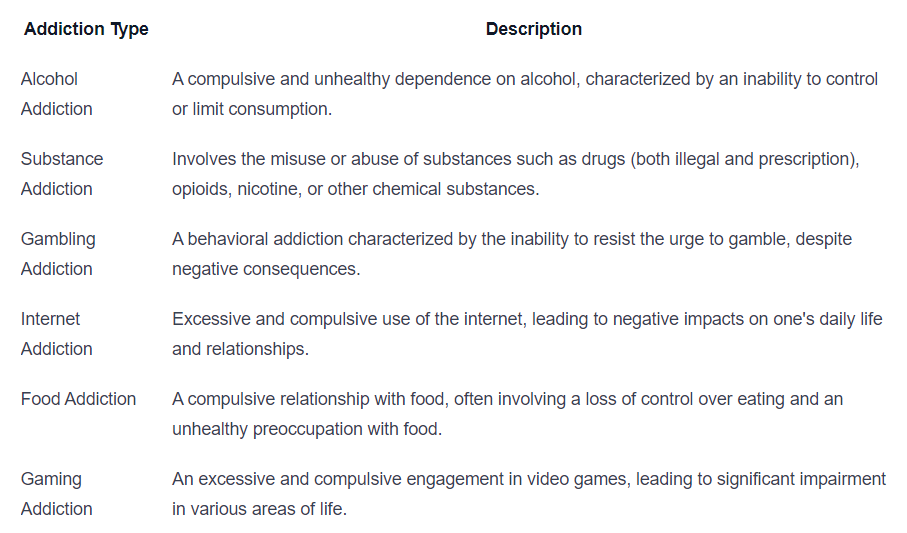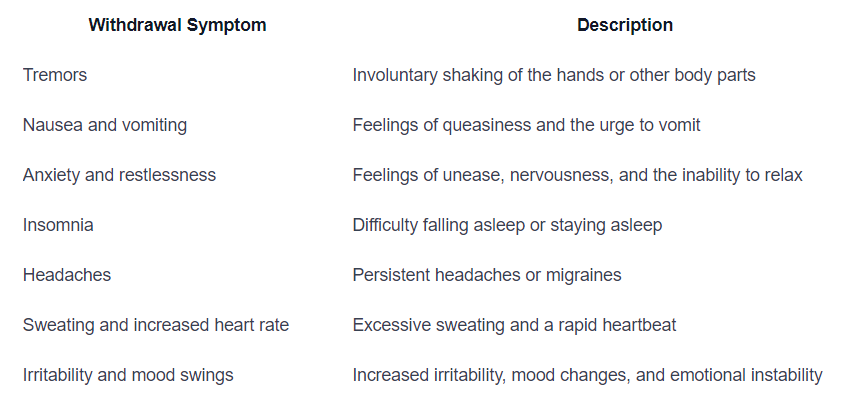Reclaim Control: A Guide to Safely Weaning Yourself Off Alcohol
May 22, 2024
Reclaim control and safely wean yourself off alcohol with expert guidance. Discover gradual reduction methods and alternative coping strategies.

Understanding Addiction
When it comes to addiction, it is important to have a clear understanding of what it entails and the different types of addictions that exist.
What is Addiction?
Addiction is a complex and chronic brain disorder characterized by the compulsive use of a substance or engagement in a behavior despite negative consequences. It is considered a disease that affects the brain's reward system, leading to intense cravings and a loss of control over the substance or behavior [1].
Addiction can have a profound impact on an individual's physical and mental health, relationships, and overall quality of life. It can affect people from all walks of life, regardless of age, gender, or social background.
Types of Addiction
There are various types of addiction, each associated with different substances or behaviors. Some common types of addiction include:

It is important to note that addiction is not limited to these examples, and individuals may struggle with multiple types of addiction simultaneously.
Understanding the nature of addiction and the different forms it can take is essential for addressing and seeking appropriate help. It is crucial to approach addiction with empathy, compassion, and a commitment to finding effective solutions for recovery.
Recognizing Alcohol Dependence
Alcohol dependence is a serious condition that can have a significant impact on an individual's physical and mental well-being. It's important to be able to recognize the signs of alcohol dependence and understand the effects of alcohol addiction.
Signs of Alcohol Dependence
Recognizing the signs of alcohol dependence is an essential first step towards addressing the issue. While the severity of symptoms may vary from person to person, some common signs of alcohol dependence include:
- Increased tolerance: Needing to consume larger amounts of alcohol to achieve the desired effects.
- Withdrawal symptoms: Experiencing physical and psychological symptoms, such as anxiety, tremors, irritability, and sweating, when attempting to stop or reduce alcohol intake.
- Loss of control: Being unable to limit or control the amount of alcohol consumed, often leading to excessive drinking.
- Neglecting responsibilities: Prioritizing drinking over work, family, and other important obligations.
- Continuous use despite negative consequences: Continuing to drink despite experiencing negative effects on physical health, relationships, and overall well-being.
It's crucial to note that alcohol dependence is a complex condition, and individuals may exhibit different combinations of these signs. If you or someone you know is displaying these signs, it's important to seek professional help and support.
Effects of Alcohol Addiction
Alcohol addiction can have wide-ranging effects on various aspects of an individual's life. Some of the primary effects of alcohol addiction include:
- Physical health consequences: Long-term excessive alcohol consumption can lead to serious health issues, such as liver disease, cardiovascular problems, digestive disorders, and an increased risk of certain cancers.
- Mental health challenges: Alcohol addiction can contribute to or worsen mental health conditions, including depression, anxiety, and alcohol-induced psychosis.
- Relationship strain: Alcohol addiction can strain relationships with family members, friends, and romantic partners, leading to conflicts, breakdowns in communication, and a loss of trust.
- Financial difficulties: The cost of maintaining an alcohol addiction can take a toll on an individual's financial stability, leading to debt, job loss, and other financial challenges.
- Legal and social consequences: Engaging in risky behaviors while under the influence of alcohol can result in legal issues, such as DUI charges, legal disputes, and strained social relationships.
Understanding the effects of alcohol addiction can serve as a motivation to seek help and take steps towards recovery. It's important to remember that seeking professional guidance and support is crucial in safely weaning off alcohol and addressing the underlying issues related to addiction.
Safely Weaning Off Alcohol
When it comes to overcoming alcohol addiction, it's important to approach the process of quitting in a safe and gradual manner. Weaning off alcohol allows the body to adjust to reduced consumption gradually, minimizing withdrawal symptoms and increasing the chances of long-term success. In this section, we will explore the importance of professional guidance, the gradual reduction approach, and alternative coping strategies for safely weaning off alcohol.
Importance of Professional Guidance
Seeking professional guidance is essential when deciding to wean off alcohol. Addiction specialists, counselors, or healthcare professionals can provide valuable support, guidance, and personalized treatment plans for individuals struggling with alcohol dependence. They can assess the severity of the addiction, provide medical advice, and recommend appropriate treatment options.
By working with professionals, individuals can receive tailored strategies to address their specific needs and circumstances. Professional guidance ensures that the weaning process is monitored, potential risks are minimized, and appropriate interventions are implemented when necessary.
Gradual Reduction Approach
A gradual reduction approach involves slowly decreasing alcohol consumption over time. This method allows the body to adjust to lower levels of alcohol and reduces the severity of withdrawal symptoms. Gradually reducing alcohol intake also helps individuals develop healthier habits and coping mechanisms, increasing the likelihood of long-term success.
To implement a gradual reduction approach, individuals can start by setting specific goals and creating a realistic timeline for reducing alcohol consumption. This approach may involve tracking and gradually decreasing the number of drinks consumed each day or week. It's important to consult with a healthcare professional or addiction specialist to determine a safe and effective reduction plan based on individual circumstances.
Alternative Coping Strategies
When weaning off alcohol, it's crucial to develop alternative coping strategies to manage cravings and address underlying triggers. Engaging in activities that promote physical and mental well-being can help individuals navigate the challenges of alcohol withdrawal. Some alternative coping strategies include:
- Physical exercise: Regular exercise can boost mood, reduce stress, and increase self-confidence. Engaging in activities such as walking, jogging, or yoga can help distract from alcohol cravings and promote overall well-being.
- Healthy lifestyle: Maintaining a healthy diet and getting enough sleep are vital during the weaning process. Proper nutrition and sufficient rest contribute to physical and mental resilience, making it easier to resist the urge to drink.
- Support groups: Joining support groups, such as Alcoholics Anonymous (AA), can provide a sense of community, understanding, and encouragement. Sharing experiences and challenges with others who have also struggled with alcohol addiction can be beneficial throughout the recovery journey.
By implementing alternative coping strategies, individuals can develop healthier habits and find effective ways to manage stress and cravings without relying on alcohol.
Safely weaning off alcohol requires commitment, support, and a personalized approach. Seeking professional guidance, implementing a gradual reduction approach, and adopting alternative coping strategies can greatly increase the chances of successful long-term recovery. Remember, each person's journey is unique, and it's crucial to consult with healthcare professionals or addiction specialists to create an individualized plan that suits specific needs and circumstances.
Managing Withdrawal Symptoms
When embarking on the journey to wean yourself off alcohol, it's important to be prepared for the potential withdrawal symptoms that may arise. Withdrawal symptoms can vary in severity depending on the individual and the extent of alcohol dependence. Understanding these symptoms and seeking appropriate medical assistance are crucial steps in safely managing the process.
Common Withdrawal Symptoms
Withdrawal symptoms can manifest both physically and mentally as the body adjusts to the absence of alcohol. Some common withdrawal symptoms may include:

It's important to note that the severity and duration of these symptoms can vary from person to person. Some individuals may experience mild symptoms that subside within a few days, while others may face more severe symptoms that require medical intervention.
Seeking Medical Assistance
When weaning off alcohol, it is highly recommended to seek medical assistance, especially if you have a history of heavy or prolonged alcohol use. Medical professionals can provide guidance, support, and appropriate interventions to ensure a safe and successful withdrawal process.
A healthcare provider can assess your individual situation, evaluate the severity of alcohol dependence, and determine the most suitable course of action. They may recommend medications to help manage withdrawal symptoms and prevent complications. Medications such as benzodiazepines or anti-seizure drugs may be prescribed to alleviate symptoms such as anxiety, tremors, and seizures.
Furthermore, medical supervision allows for regular monitoring of vital signs, hydration levels, and overall well-being during the withdrawal process. This ensures that any potential complications can be addressed promptly and effectively.
Remember, alcohol withdrawal can be potentially dangerous, especially in severe cases. It is not recommended to attempt to self-detox without medical supervision, as complications such as delirium tremens (DTs) or seizures may arise. Seeking professional medical assistance provides you with a higher level of safety and support, increasing the likelihood of a successful recovery.
By understanding the common withdrawal symptoms and seeking appropriate medical assistance, you can navigate the weaning process with greater confidence and safety. Always consult with a healthcare professional who specializes in addiction medicine to receive personalized guidance and support throughout your journey to sobriety.
Building a Support System
When it comes to weaning off alcohol safely, building a strong support system is crucial for success. Having the right support can provide encouragement, accountability, and guidance throughout the recovery process. Two key components of a support system are family and friends support, as well as therapy and counseling.
Family and Friends Support
The support of family and friends can play a significant role in helping individuals overcome alcohol addiction. Loved ones can provide emotional support, understanding, and encouragement during the challenging journey of recovery. They can also serve as an accountability system, keeping individuals motivated and on track.
It's important for family and friends to educate themselves about alcohol addiction and recovery, so they can offer informed support. By learning about the nature of addiction and understanding the challenges involved, they can provide empathy and assistance in a more effective manner.
Engaging in open and honest communication with family and friends is essential. This can help individuals in recovery express their needs, fears, and frustrations, while also allowing their loved ones to provide the necessary support. Creating a safe and non-judgmental environment promotes trust and strengthens the bond between the individual and their support network.
Therapy and Counseling
Therapy and counseling are integral parts of the recovery process for individuals struggling with alcohol addiction. These professional interventions provide specialized guidance and support tailored to each individual's needs.
Therapy sessions, such as individual therapy or group therapy, offer a safe space for individuals to explore the underlying causes of their addiction, identify triggers, and develop coping strategies. Therapists and counselors can help individuals develop effective techniques to manage cravings, stress, and other emotional challenges that may arise during the recovery process.
Cognitive-behavioral therapy (CBT) is a commonly used therapeutic approach in alcohol addiction treatment. It focuses on identifying and changing negative thought patterns and behaviors associated with alcohol use. CBT equips individuals with the necessary skills to manage cravings, make healthier choices, and develop a more positive outlook on life.
Support groups, such as Alcoholics Anonymous (AA), can also provide valuable support and a sense of community during the recovery journey. These groups allow individuals to connect with others who have similar experiences, share their stories, and learn from one another's successes and setbacks.
By combining the support of family and friends with therapy and counseling, individuals in recovery can establish a comprehensive support system. This network of support helps individuals stay motivated, navigate challenges, and maintain long-term sobriety. Remember, reaching out for help is a sign of strength, and there are resources available to assist individuals in their journey toward a healthier, alcohol-free life.
Maintaining Sobriety
Once you have successfully weaned yourself off alcohol, it is essential to focus on maintaining sobriety in the long run. This involves adopting healthy lifestyle choices, avoiding triggers, and implementing long-term recovery strategies.
Healthy Lifestyle Choices
Making healthy lifestyle choices is crucial for maintaining sobriety. Engaging in activities that promote physical and mental well-being can help fill the void left by alcohol. Consider incorporating the following practices into your daily routine:
- Regular Exercise: Regular exercise not only improves physical health but also releases endorphins, which can boost mood and reduce cravings.
- Balanced Diet: A healthy diet rich in fruits, vegetables, lean proteins, and whole grains provides essential nutrients and supports overall well-being.
- Adequate Sleep: Prioritize quality sleep to allow your body and mind to recover and function optimally.
- Stress Management: Practice stress management techniques such as deep breathing, meditation, or engaging in hobbies to cope with stressors without turning to alcohol.
- Supportive Relationships: Surround yourself with supportive friends and family who understand your journey and encourage your commitment to sobriety.
Avoiding Triggers
Identifying and avoiding triggers that may tempt you to consume alcohol is crucial for maintaining sobriety. Triggers can be environmental, social, or emotional factors that may lead to cravings or relapse. Consider the following strategies:
- Change Your Environment: Remove alcohol from your home and avoid places that may trigger cravings, such as bars or parties where alcohol is prevalent.
- Build Healthy Habits: Replace old habits associated with drinking with new, healthier activities. Find alternative ways to relax and socialize that don't involve alcohol.
- Develop Coping Mechanisms: Learn and practice healthy coping mechanisms to deal with stress, anxiety, or negative emotions without turning to alcohol. This can include journaling, talking to a trusted friend, or engaging in creative outlets.
Long-Term Recovery Strategies
Maintaining sobriety is a lifelong journey that requires ongoing effort and commitment. Consider implementing the following long-term recovery strategies:
- Continued Support: Stay connected with support groups, such as Alcoholics Anonymous (AA) or other recovery programs, to surround yourself with individuals who understand your struggles and can provide guidance and encouragement.
- Therapy or Counseling: Consider engaging in individual or group therapy to address any underlying issues that may have contributed to your alcohol dependence. Therapy can provide valuable tools and insights to support your recovery journey.
- Self-Care: Prioritize self-care activities that promote self-reflection, personal growth, and self-compassion. This can include practicing mindfulness, engaging in hobbies, or taking time for relaxation and self-reflection.
Remember, maintaining sobriety is a personal journey, and everyone's experience is unique. It's important to find the strategies and techniques that work best for you. By making healthy lifestyle choices, avoiding triggers, and implementing long-term recovery strategies, you can increase your chances of maintaining a fulfilling and alcohol-free life.
Medical Disclaimer
The content of this website such as text, graphics, images, and other material contained on the website are for informational purposes only and does not constitute medical advice; the Content is not intended to be a substitute for professional medical advice, diagnosis, or treatment. Always seek the advice of a physician or other qualified health provider with any questions you may have regarding a medical condition. Never disregard professional medical advice or delay in seeking it because of something you have read on this website. In the event of a medical emergency, call a doctor or 911 immediately. This website does not recommend or endorse any specific tests, physicians, products, procedures, opinions, or other information that may be mentioned on the Site. Reliance on any information provided by this website is solely at your own risk.



